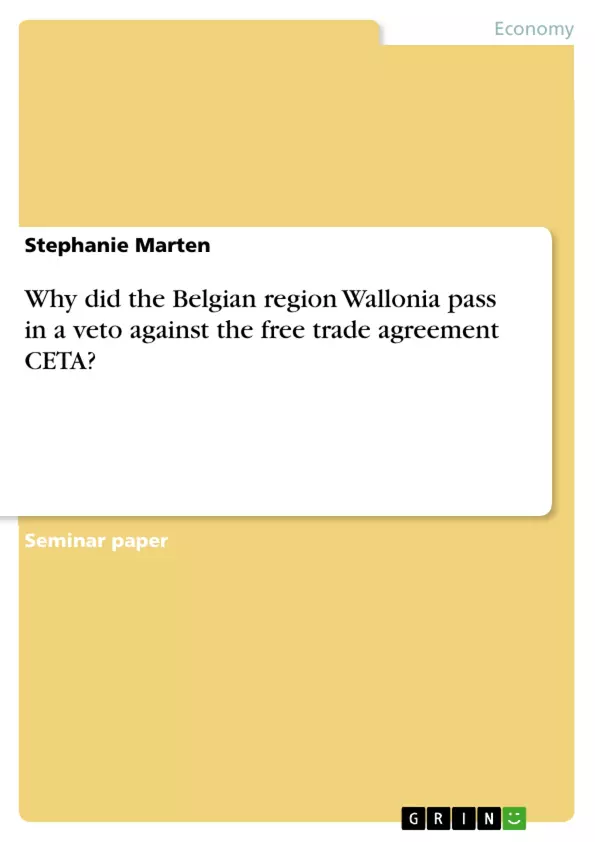A small region in Belgium caused the fear that seven years of negotiation have been done in vain. This event gives rise to many questions. Why was this small region able to veto in the first place? Is this veto justified? And why did the Belgian region Wallonia pass in a veto against the FTA CETA? To answer, especially, the last question, the reader will first be introduced to the political and historical context concerning this situation. With the higher involvement of untraditional trade actors in trade politics mentioned above, a liberal approach is the method most practical for the analysis. Because of the breadth of Andrew Moravcsik's Variants of Liberalism Approach, this theory will be used in the analysis. The conclusion introduces the aftermath of the negotiations, summarises the results and tries to find the answer to the research question.
Inhaltsverzeichnis (Table of Contents)
- Introduction
- Political and Historical Context
- CETA - Comprehensive Economic and Trade Agreement
- Basic Information
- Advantages and Disadvantages
- Lisbon Treaty (2009)
- Wallonia - Core Facts
- Theoretical Framework and Analysis
- Variants of Liberal Theory
- Ideational Liberalism: Identity and Legitimate Social Order
- National Identity
- Political Identity
- Socio-economic Identity
- Commercial Liberalism: Economic Assets and Cross-Border Transactions
- Republican Liberalism: Representation and Rent Seeking
- Conclusion
Zielsetzung und Themenschwerpunkte (Objectives and Key Themes)
This paper examines the reasons behind Wallonia's veto against the Comprehensive Economic and Trade Agreement (CETA) between Canada and the European Union. The paper analyzes the historical and political context of the situation, focusing on the key features of CETA, the role of the Lisbon Treaty, and the implications for the EU's trade policy.
- The impact of CETA on trade relations between Canada and the EU
- The implications of the Investment Court System (ICS) for European sovereignty and democracy
- The influence of liberal theory in explaining the veto
- The significance of the Lisbon Treaty and its impact on EU decision-making
- The role of public opinion and the influence of non-traditional trade actors in shaping trade policy
Zusammenfassung der Kapitel (Chapter Summaries)
- Introduction: The paper introduces the context of the CETA veto, highlighting the growing role of non-traditional trade actors and public opinion in shaping trade agreements. It also introduces the research question: why did Wallonia veto CETA?
- Political and Historical Context: This chapter examines the CETA agreement, outlining its basic information, advantages and disadvantages, and the role of the Lisbon Treaty in allowing for regional vetoes within the EU.
Schlüsselwörter (Keywords)
The main keywords and focus topics of this paper include: CETA, trade agreements, European Union, Wallonia, liberal theory, Lisbon Treaty, Investment Court System (ICS), national identity, economic assets, representation, public opinion, non-traditional trade actors, democracy, sovereignty.
Frequently Asked Questions
Why did the Belgian region of Wallonia veto CETA?
The veto was driven by concerns regarding socio-economic identity, the protection of public services, and specifically the controversial Investment Court System (ICS), which was seen as a threat to democratic sovereignty.
How was a small region able to block a major EU trade agreement?
Under the Lisbon Treaty and the Belgian federal system, regional parliaments must give their consent to trade agreements that involve regional competencies, giving them a de facto veto power.
What is CETA?
CETA stands for the Comprehensive Economic and Trade Agreement, a free trade agreement between Canada and the European Union aimed at reducing tariffs and harmonizing regulations.
What are the main criticisms of the Investment Court System (ICS)?
Critics argue that the ICS allows corporations to sue governments over laws that affect their profits, potentially undermining environmental, labor, and health standards.
Which theoretical approach is used to analyze the CETA veto?
The analysis utilizes Andrew Moravcsik's Variants of Liberalism, focusing on ideational, commercial, and republican liberalism to explain the motivations of the actors involved.
- Quote paper
- Stephanie Marten (Author), 2017, Why did the Belgian region Wallonia pass in a veto against the free trade agreement CETA?, Munich, GRIN Verlag, https://www.grin.com/document/372243



